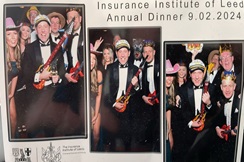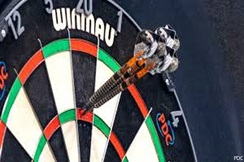Insurance Institute of Bradford - Fraud Detection Seminar
(blank)
Key speaker - Tim Richardson, Director of Investigation Operations, Direct Group.
We were delighted to attend a seminar yesterday afternoon in Bradford, presented by Tim Richardson from Direct Group, where he gave a great insight in to how fraud is detected within the insurance industry.
Tim began his insurance career in 1986, starting as a Claims Handler, progressing to a Loss Adjuster and latterly moving into senior management positions. Whilst detecting fraud has always been part and parcel of Tim’s career, his last few appointments have purely been focused on the investigation of fraudulent activities.
Tim is an impressive individual and more than qualified to deliver a seminar on fraud detection – in fact, he is the only person in the UK to be accredited with ACII, ACILA and ACFS. Well done Tim!
As I am sure you won’t be surprised to hear, fraud is on the increase, whether this is from policyholders exaggerating genuine claims, opportunists spotting potential ‘quick wins’, crash for cash exploits, as well as an increasing number of claimants who are reporting made-up losses due to their financial difficulties.
Some cases are straight forward and are swiftly quashed, however many require in-depth investigation. During the lecture, we heard some highly amusing stories about the great lengths that some (anonymous) claimants had gone to in order to concoct plausible (or should I say highly implausible!) stories surrounding their claims. Detection of fraud is definitely an art form; it can be challenging and frustrating, even when there are no doubts that the policyholder is being dishonest, because without sufficient proof or evidence, opinions don’t count. It is imperative that all the correct processes and procedures are adhered to, ensuring that the investigation is water tight and statements are signed. We learnt of a number of interesting and varied indicators that can be used to detect fraud, which include analysing body language and natural reactions such as blushing, change of vocal tone/pitch, hesitation, or avoiding difficult subjects when questioned. We automatically have an emotional connection to stories that are true - we reflect on memories and visual images, which allow us to provide real detail on not only the loss, but the environment/surroundings we were in at the time. When claimants are lying, obviously they don’t have these emotional connections to relate to, which is how stories can spiral out of control and holes begin to appear in their original statements.
In the last ABI report which was issued in 2011, there were 71,000 dishonest Household claims and 45,000 dishonest Motor claims. The final figures for 2012 will be issued in September 2013. People like Tim and his team are saving insurers millions of pounds a year!
If you would like to review the presentation, or make an enquiry as to how Tim and his team can help your business, please feel free to contact him directly on: 07557567013 or tim.richardson@directgroup.co.uk
Previous Articles
Latest Articles
Blog
- 01/07/2024
- Insurance Specific Employee Health & Wellbeing Opportunity
 Our exciting new collaboration – Insurance Specific Employee Health & Wellbeing OpportunityEmployee health and wellbeing is a massively important subject, and it’s great to see so many of our insurance clients taking this so seriously.To us, it’s a bit of a no-brainer; a happier, healthier team will lead to – Increased productivity Minimal lost hours to sickness Talent acquisition & staff retention A work force of high energy, company ambassadors that are engaged with your goals But where do you start? Not all firms have the time or budget to roll out their own inhouse programme, and let's face it - employee surveys may not be as honest if you know the person who is responsible for your pay review is going to be reading it!So, we’ve teamed up with the lovely Lisa Kempster, who may many of you know – she enjoyed a successful career as an insurance recruiter prior to setting up her own Health & Well being practice. Lisa’s got over 15 years’ experience of partnering with insurance businesses so understands the challenges of the job, the industry, along with the importance of return on your investment. To top that off, Lisa is partnering as a Consultant with West Yorkshire Business Boost, so you may be able to claim back 50% of the cost of your programme, regardless of where you are based (broker clients – you’ll be glad to know she won’t be adding VAT to your invoice either)!...
Our exciting new collaboration – Insurance Specific Employee Health & Wellbeing OpportunityEmployee health and wellbeing is a massively important subject, and it’s great to see so many of our insurance clients taking this so seriously.To us, it’s a bit of a no-brainer; a happier, healthier team will lead to – Increased productivity Minimal lost hours to sickness Talent acquisition & staff retention A work force of high energy, company ambassadors that are engaged with your goals But where do you start? Not all firms have the time or budget to roll out their own inhouse programme, and let's face it - employee surveys may not be as honest if you know the person who is responsible for your pay review is going to be reading it!So, we’ve teamed up with the lovely Lisa Kempster, who may many of you know – she enjoyed a successful career as an insurance recruiter prior to setting up her own Health & Well being practice. Lisa’s got over 15 years’ experience of partnering with insurance businesses so understands the challenges of the job, the industry, along with the importance of return on your investment. To top that off, Lisa is partnering as a Consultant with West Yorkshire Business Boost, so you may be able to claim back 50% of the cost of your programme, regardless of where you are based (broker clients – you’ll be glad to know she won’t be adding VAT to your invoice either)!...- 01/07/2024
- Cryptocurrency: A Wealth of Opportunity for the Insurance Market
 Cryptocurrency: A Wealth of Opportunity for the Insurance MarketSince the development of Bitcoin in 2009, cryptocurrency has been an innovative new player in the financial sector; a groundbreaking way to own wealth outside of fiat currency. With the growth of cryptocurrency, there has come an array of new risks, as cyber criminals have become aware that exploitation of this new arena can be highly lucrative. It is estimated that in 2022, there were about $3.7 billion in crypto losses.[i] Inevitably, this kind of risk has presented both a challenge and an opportunity for the insurance market, as insurers have the chance to work alongside the cryptocurrency sector, offering risk mitigation and financial protection.An opportunityWhile cryptocurrency has grown in leaps and bounds over the past 15 years, it appears that, for the moment, the insurance sector is playing catch-up. In 2023, Evertas, a large Cryptocurrency insurer, estimated that a mere 2-3% of crypto assets were insured globally.[ii] Now is the opportunity for forward thinking insurance organisations to step up to the plate in this arena; offering value for money insurance policies and support with risk mitigation to the businesses making their money from cryptocurrency.What type of insurance?Different companies make money from cryptocurrency in different ways; from mining new coins, to storing keys for themselves or clients, or managing transactions. A good insurance broker will need to look at exactly what services the business provides and at what volume. They can then offer advice on the optimum insurance policy, to ensure that the business is not underinsured, and that they have access to a value-for-money policy that covers all the risks. This offering is likely to be across a number of kinds of insurance which could include the following:Cyber insuranceOne of the most obvious insurance requirements for a cryptocurrency business is insurance against cyber-attacks. Naturally, a wealth which is both ...
Cryptocurrency: A Wealth of Opportunity for the Insurance MarketSince the development of Bitcoin in 2009, cryptocurrency has been an innovative new player in the financial sector; a groundbreaking way to own wealth outside of fiat currency. With the growth of cryptocurrency, there has come an array of new risks, as cyber criminals have become aware that exploitation of this new arena can be highly lucrative. It is estimated that in 2022, there were about $3.7 billion in crypto losses.[i] Inevitably, this kind of risk has presented both a challenge and an opportunity for the insurance market, as insurers have the chance to work alongside the cryptocurrency sector, offering risk mitigation and financial protection.An opportunityWhile cryptocurrency has grown in leaps and bounds over the past 15 years, it appears that, for the moment, the insurance sector is playing catch-up. In 2023, Evertas, a large Cryptocurrency insurer, estimated that a mere 2-3% of crypto assets were insured globally.[ii] Now is the opportunity for forward thinking insurance organisations to step up to the plate in this arena; offering value for money insurance policies and support with risk mitigation to the businesses making their money from cryptocurrency.What type of insurance?Different companies make money from cryptocurrency in different ways; from mining new coins, to storing keys for themselves or clients, or managing transactions. A good insurance broker will need to look at exactly what services the business provides and at what volume. They can then offer advice on the optimum insurance policy, to ensure that the business is not underinsured, and that they have access to a value-for-money policy that covers all the risks. This offering is likely to be across a number of kinds of insurance which could include the following:Cyber insuranceOne of the most obvious insurance requirements for a cryptocurrency business is insurance against cyber-attacks. Naturally, a wealth which is both ...- 02/05/2024
- Aston Charles Sponsors Insurance Institute of Leeds 134rd Annual Dinner
 Aston Charles Sponsors Insurance Institute of Leeds 134rd Annual DinnerOnce again, Aston Charles sponsored the Insurance Institute of Leeds Annual Dinner. For many, the ‘Annual Do’ is the highlight of the Yorkshire insurance community’s calendar, and this year certainly didn’t disappoint. In a slight change to the usual format, the formalities were unexpectedly paused by the armouries’ staff to make a surprise announcement – only to reveal they were actually the musical group ‘The Singing Waiters’ who launched into an array of dancing-floor filling party favourites and, perhaps most notably, a conga-dance around the Royal Armouries’ New Dock Hall featuring the cream of the Yorkshire insurance market!The team were joined by guests from UK Global (Part of The Howden Group), Willis Towers Watson, CNA Hardy and Schofield Insurance Brokers (Ethos Broking). The event was raising money for the Chartered Insurance Institute’s ‘The Insurance Charities’ as well as IIL’s President, Kate Edmondson’s chosen charity for the year, Sue Ryder Manorlands Hospice. The event’s other headline sponsors include Marsh, Liberty Speciality Markets, and the Bespoke Group....
Aston Charles Sponsors Insurance Institute of Leeds 134rd Annual DinnerOnce again, Aston Charles sponsored the Insurance Institute of Leeds Annual Dinner. For many, the ‘Annual Do’ is the highlight of the Yorkshire insurance community’s calendar, and this year certainly didn’t disappoint. In a slight change to the usual format, the formalities were unexpectedly paused by the armouries’ staff to make a surprise announcement – only to reveal they were actually the musical group ‘The Singing Waiters’ who launched into an array of dancing-floor filling party favourites and, perhaps most notably, a conga-dance around the Royal Armouries’ New Dock Hall featuring the cream of the Yorkshire insurance market!The team were joined by guests from UK Global (Part of The Howden Group), Willis Towers Watson, CNA Hardy and Schofield Insurance Brokers (Ethos Broking). The event was raising money for the Chartered Insurance Institute’s ‘The Insurance Charities’ as well as IIL’s President, Kate Edmondson’s chosen charity for the year, Sue Ryder Manorlands Hospice. The event’s other headline sponsors include Marsh, Liberty Speciality Markets, and the Bespoke Group....- 17/04/2024
- Aston Charles hosts a charity insurance Darts evening
 Aston Charles hosts a charity insurance community Darts evening, on behalf of Simon on the Streets.After the success of our previous charity nights for our friends and clients in the insurance industry, such as a Curling evening and a Go-Karting night, the team at Aston Charles had been thinking about organising another event for a couple of weeks. By chance, we were having a catch up in Leeds city centre, and bumped into a couple of our Broker friends who were attending a networking event for Simon on the Streets in the bar next door. We were promptly invited to join in the fun and meet attendees including, amongst others, Leo Jones-Rowe, who alongside the day job of being a Partner of Schofield Sweeney, is also Chair of Simon on the Streets. Always one to call out Richard’s procrastination, Annie and James were quick to suggest that we support Simon on the Streets for our next event and, and as many of our clients enjoy Darts (and not to mention the ‘Luke Littler Effect’!) we promptly decided to hire a floor of Flight Club on Park Row, Leeds.Fast-forward a couple of weeks, and we were delighted to host insurance professionals from across the UK at our event. The winner of the individual trophy was Craig Dinnewell of UK Global (Part of Howden Group), with silver and bronze medals going to Tom O’Connell (C&C Insurance Brokers) and Rhys Jones (also UK Global) respectively. This meant that UK Global also picked up the Team Trophy, winning a complementary round of Darts – kindly donated by the team at Flight Club Leeds. As well as being joined by many of our insurance contacts, we were also joined by our friends from the legal sector such as DWF and, of course, Schofield Sweeney. Simon on the Streets is an independent charity offering emotional and practical support for homeless and vulnerable people to enable them to achieve their goals....
Aston Charles hosts a charity insurance community Darts evening, on behalf of Simon on the Streets.After the success of our previous charity nights for our friends and clients in the insurance industry, such as a Curling evening and a Go-Karting night, the team at Aston Charles had been thinking about organising another event for a couple of weeks. By chance, we were having a catch up in Leeds city centre, and bumped into a couple of our Broker friends who were attending a networking event for Simon on the Streets in the bar next door. We were promptly invited to join in the fun and meet attendees including, amongst others, Leo Jones-Rowe, who alongside the day job of being a Partner of Schofield Sweeney, is also Chair of Simon on the Streets. Always one to call out Richard’s procrastination, Annie and James were quick to suggest that we support Simon on the Streets for our next event and, and as many of our clients enjoy Darts (and not to mention the ‘Luke Littler Effect’!) we promptly decided to hire a floor of Flight Club on Park Row, Leeds.Fast-forward a couple of weeks, and we were delighted to host insurance professionals from across the UK at our event. The winner of the individual trophy was Craig Dinnewell of UK Global (Part of Howden Group), with silver and bronze medals going to Tom O’Connell (C&C Insurance Brokers) and Rhys Jones (also UK Global) respectively. This meant that UK Global also picked up the Team Trophy, winning a complementary round of Darts – kindly donated by the team at Flight Club Leeds. As well as being joined by many of our insurance contacts, we were also joined by our friends from the legal sector such as DWF and, of course, Schofield Sweeney. Simon on the Streets is an independent charity offering emotional and practical support for homeless and vulnerable people to enable them to achieve their goals....- 16/04/2024
- The Insurance Industry: Reacting to a Disrupted Market
 The Insurance Industry: Reacting to a Disrupted MarketAs the insurance sector surveys the landscape for 2024 and beyond, there are a number of changes in sight. New technology, extreme events and changing cultures are all shifting the way Property and Casualty insurance needs to operate. Some of these new factors create opportunities, while others create risks; many offer both.Responding to market disruption is nothing new for P&C insurance. While the specific factors may be unprecedented, the insurance sector has always been at the forefront of predicting and responding to new risks.In this article we will look at some of the key elements that are changing (or are set to change) the industry within the next few years.Artificial IntelligenceIt is impossible to discuss disruptive markets without talking about AI. Artificial Intelligence has been on the scene for a few years now, but as it continues to develop, it brings about innovation and opportunity, while also creating risk, uncertainty, and potential problems. Almost all industries need to adapt to a world where AI is commonplace.AI offers massive opportunity to the insurance industry. It can reduce risk, increase speed and refine processes across the board. AI can interact with clients in a more supportive way than ever, meeting their requirements and even anticipating their needs in a way that has not been possible before. At the same time, lots of clients struggle with the impersonal nature of AI – although this is improving all the time, as it becomes more adept at mimicking human emotional responses. Of course, there are dangers that come with computer learned behaviours. One recognised risk is that AI is vulnerable to using data to inadvertently create an illegal or unethical bias – for example, a bias against a protected group. This could result in fines and legal sanctioning, as well as a significant loss of trust in the methods being used by the industry. As this is already a recognised risk, ...
The Insurance Industry: Reacting to a Disrupted MarketAs the insurance sector surveys the landscape for 2024 and beyond, there are a number of changes in sight. New technology, extreme events and changing cultures are all shifting the way Property and Casualty insurance needs to operate. Some of these new factors create opportunities, while others create risks; many offer both.Responding to market disruption is nothing new for P&C insurance. While the specific factors may be unprecedented, the insurance sector has always been at the forefront of predicting and responding to new risks.In this article we will look at some of the key elements that are changing (or are set to change) the industry within the next few years.Artificial IntelligenceIt is impossible to discuss disruptive markets without talking about AI. Artificial Intelligence has been on the scene for a few years now, but as it continues to develop, it brings about innovation and opportunity, while also creating risk, uncertainty, and potential problems. Almost all industries need to adapt to a world where AI is commonplace.AI offers massive opportunity to the insurance industry. It can reduce risk, increase speed and refine processes across the board. AI can interact with clients in a more supportive way than ever, meeting their requirements and even anticipating their needs in a way that has not been possible before. At the same time, lots of clients struggle with the impersonal nature of AI – although this is improving all the time, as it becomes more adept at mimicking human emotional responses. Of course, there are dangers that come with computer learned behaviours. One recognised risk is that AI is vulnerable to using data to inadvertently create an illegal or unethical bias – for example, a bias against a protected group. This could result in fines and legal sanctioning, as well as a significant loss of trust in the methods being used by the industry. As this is already a recognised risk, ...- 16/04/2024
- Insurance Costs Rising with Flood Risks: How Can Brokers Help?
 Insurance Costs Rising with Flood Risks: How Can Brokers Help?2023 recorded a record home insurance price increase. Consultants, Pearson Ham stated that the cost of building and contents cover went up by 40% from 2022 to 2023.[i] This is quite a blow for already financially stretched homeowners as they try to cope with the cost-of-living crisis.When people purchase insurance, they want to know that they are getting a product that is protecting them, while also being value for money. Doubtless, they will be questioning why there has been such a swift rise – especially for those individuals who have not made any claims. Insurance brokers are uniquely placed to help policy buyers understand what is happening in terms of their home insurance, while making sure that they have an insurance policy in place that meets their needs. Why the price rises?Price rises have been happening across all areas of insurance for a variety of reasons. One of the major causes of the price increase for building and contents insurance is down to the vast expenses associated with a rise in freak weather incidents over recent years. In the United Kingdom, this is often related to storms and flooding.Sadly, flooding has become a regular issue for homeowners in many parts of the UK. The Environment Agency put the number of homes at risk of flooding at 5.2 million in England alone.[ii] This number will be rising all the time. Average insurance claims in the aftermath of flooding are £48,551 for houses and £11,489 for contents. Following the storms of October and November 2023, a massive £352 million was paid out by insurers.[iii]These costs do, of course, have to be passed onto the policyholders to allow insurance to remain viable. Reassuring clientsLots of insurance customers are understandably anxious about the rises in home insurance costs, as well as rises in excess charges and worries about under insurance. What can brokers do to ease the concerns of their clients, while making sure that ...
Insurance Costs Rising with Flood Risks: How Can Brokers Help?2023 recorded a record home insurance price increase. Consultants, Pearson Ham stated that the cost of building and contents cover went up by 40% from 2022 to 2023.[i] This is quite a blow for already financially stretched homeowners as they try to cope with the cost-of-living crisis.When people purchase insurance, they want to know that they are getting a product that is protecting them, while also being value for money. Doubtless, they will be questioning why there has been such a swift rise – especially for those individuals who have not made any claims. Insurance brokers are uniquely placed to help policy buyers understand what is happening in terms of their home insurance, while making sure that they have an insurance policy in place that meets their needs. Why the price rises?Price rises have been happening across all areas of insurance for a variety of reasons. One of the major causes of the price increase for building and contents insurance is down to the vast expenses associated with a rise in freak weather incidents over recent years. In the United Kingdom, this is often related to storms and flooding.Sadly, flooding has become a regular issue for homeowners in many parts of the UK. The Environment Agency put the number of homes at risk of flooding at 5.2 million in England alone.[ii] This number will be rising all the time. Average insurance claims in the aftermath of flooding are £48,551 for houses and £11,489 for contents. Following the storms of October and November 2023, a massive £352 million was paid out by insurers.[iii]These costs do, of course, have to be passed onto the policyholders to allow insurance to remain viable. Reassuring clientsLots of insurance customers are understandably anxious about the rises in home insurance costs, as well as rises in excess charges and worries about under insurance. What can brokers do to ease the concerns of their clients, while making sure that ...- 27/02/2024
- The MGA Model: Reliable or Redundant?
 The MGA Model: Reliable or Redundant? Placing over 10% of the UK’s insurance premiums, Managing General Agents have become a fixture of insurance in this country. While MGAs enjoyed a number of years of expansion through recent decades, over the past three years, they have seen a small amount of decline. Some companies may be questioning whether use of MGAs is still a business model that works as we move forwards into 2024. Are there more opportunities for the future of MGAs, or is it time to move on and look at different models?What are MGA’s?MGAs are insurance agents, authorised by insurers to carry out a variety of roles such as underwriting and negotiating contracts on behalf of that insurer. They may also be involved in settling claims or appointing brokers. They work within parameters agreed with the insurer.[i]The partnership between insurers and MGAs can be a very beneficial one. MGAs tend to have specific strengths in their field of expertise, and they can offer insights into particular markets that large insurers may not be able to access as efficiently. Meanwhile, the large insurers can offer capital, flexibility and resources that maximise the insurance offerings for clients and the profitability of the programme. [ii]Is the model declining?Although it is acknowledged that there are lots of benefits to the MGA model, the past three years has seen their growth declining. Insurance DataLab revealed the preliminary findings of its 2022 MGA performance report exclusively in Insurance Times, rating the performance of MGAs based on their financial performance. It showed that while 2020 saw an average growth score of 53.8%, this decreased to 51.6% and 49.4% in 2021 and 2022 respectively. [iii]While this will be of concern to those investing in and managing the MGAs, at the same time it’s important to recognise that the past three years is not a neutral sample to analyse. The insurance industry has had a very challenging few years across the board. ...
The MGA Model: Reliable or Redundant? Placing over 10% of the UK’s insurance premiums, Managing General Agents have become a fixture of insurance in this country. While MGAs enjoyed a number of years of expansion through recent decades, over the past three years, they have seen a small amount of decline. Some companies may be questioning whether use of MGAs is still a business model that works as we move forwards into 2024. Are there more opportunities for the future of MGAs, or is it time to move on and look at different models?What are MGA’s?MGAs are insurance agents, authorised by insurers to carry out a variety of roles such as underwriting and negotiating contracts on behalf of that insurer. They may also be involved in settling claims or appointing brokers. They work within parameters agreed with the insurer.[i]The partnership between insurers and MGAs can be a very beneficial one. MGAs tend to have specific strengths in their field of expertise, and they can offer insights into particular markets that large insurers may not be able to access as efficiently. Meanwhile, the large insurers can offer capital, flexibility and resources that maximise the insurance offerings for clients and the profitability of the programme. [ii]Is the model declining?Although it is acknowledged that there are lots of benefits to the MGA model, the past three years has seen their growth declining. Insurance DataLab revealed the preliminary findings of its 2022 MGA performance report exclusively in Insurance Times, rating the performance of MGAs based on their financial performance. It showed that while 2020 saw an average growth score of 53.8%, this decreased to 51.6% and 49.4% in 2021 and 2022 respectively. [iii]While this will be of concern to those investing in and managing the MGAs, at the same time it’s important to recognise that the past three years is not a neutral sample to analyse. The insurance industry has had a very challenging few years across the board. ...- 21/11/2023
- The Risks and Rewards of Investing in Insurance
 The Risks and Rewards of Investing in InsuranceFor a number of years, investing in the insurance sector was a (relatively speaking) safe bet in the stock market. While not paying huge dividends, investors tended to have confidence that their investments would grow; after all, insurance is entirely necessary for almost every business and individual, regardless of what is happening in the wider economy.However, in recent years, a number of factors have seen some drops in profits, making investors question whether insurance stocks still hold the same low risk benefits as they did before.*A guide to insurance wealthInsurance companies make their money in two ways.1) Insuring businesses and individuals for unforeseen events. The hope is that losses will not occur and then the insurance company will make a profit. This is the underwriting profit.2) Money that is paid in by policyholders is known as a float, and insurance companies invest this float until it is needed to pay a claim. This is most usually invested in low-risk stocks and bonds. [i]The risksInsurance companies face a double risk at the moment. Firstly, world events over recent years have created an unstable environment for Underwriters to assess. Property and Casualty insurance has had an unprecedented number of claims. Secondly, the current economic downturn has meant that investments have not been as profitable as hoped.Car insurance has probably been one of the worst hit sectors of the insurance industry. Since the end of the travel restrictions brought about by Covid, there have been an increased number of car accidents, pushing up the number of claims. At the same time, an increase in the cost of parts and labour means that cost per claim payout has been increasing. In 2022, the car insurance sector announced a net combined ratio (NCR) of 109.5% - the poorest figure in a decade. The NCR denotes the cost of claims as a percentage of premiums, ...
The Risks and Rewards of Investing in InsuranceFor a number of years, investing in the insurance sector was a (relatively speaking) safe bet in the stock market. While not paying huge dividends, investors tended to have confidence that their investments would grow; after all, insurance is entirely necessary for almost every business and individual, regardless of what is happening in the wider economy.However, in recent years, a number of factors have seen some drops in profits, making investors question whether insurance stocks still hold the same low risk benefits as they did before.*A guide to insurance wealthInsurance companies make their money in two ways.1) Insuring businesses and individuals for unforeseen events. The hope is that losses will not occur and then the insurance company will make a profit. This is the underwriting profit.2) Money that is paid in by policyholders is known as a float, and insurance companies invest this float until it is needed to pay a claim. This is most usually invested in low-risk stocks and bonds. [i]The risksInsurance companies face a double risk at the moment. Firstly, world events over recent years have created an unstable environment for Underwriters to assess. Property and Casualty insurance has had an unprecedented number of claims. Secondly, the current economic downturn has meant that investments have not been as profitable as hoped.Car insurance has probably been one of the worst hit sectors of the insurance industry. Since the end of the travel restrictions brought about by Covid, there have been an increased number of car accidents, pushing up the number of claims. At the same time, an increase in the cost of parts and labour means that cost per claim payout has been increasing. In 2022, the car insurance sector announced a net combined ratio (NCR) of 109.5% - the poorest figure in a decade. The NCR denotes the cost of claims as a percentage of premiums, ...- 16/10/2023
- The High Price of Synthetic ID Fraud during a Cost-of-Living Crisis
 Fraud is on the rise worldwide. In the UK the National Fraud Intelligence Bureau recorded 17% more fraud related crimes in the year ending March 2022 than the same period the previous year. [i] Fraud can affect most industries, with the insurance sector being no exception. The rise in insurance fraud is costing insurance companies huge amounts of money and time. With the current cost of living crisis and many clients already struggling to make ends meet, this is the worst time to be passing the cost of fraud on to customers.Some statistics suggest that in a massive 85% of insurance fraud cases, the cause can be traced back to synthetic ID fraud. [ii] If synthetic ID fraud can be dealt with effectively, it will vastly reduce the cost of fraudulent activity to insurance groups and the clients they serve.Types of ID fraudID fraud has long been an issue for businesses and individuals to contend with. In the past, ID was simply stolen and then used directly to open accounts or steal money. In this type of identity theft, there is a clearly identifiable “victim” who is likely, once aware of the issue, to log the crime and alert companies to the fraudulent activity taking place. In the case of insurance companies, they could then refuse pay outs and cancel policies.However, the advance of technology has led to identity fraud becoming more and more complex, with the birth of synthetic ID fraud. Unlike with stolen IDs, these synthetic identities may have no single “victim” meaning that there might never be a crime recorded, so it can be very difficult to identify that a crime has taken place. Synthetic ID can come in different formats. In manipulated synthetics, a genuine ID may be modified in the favour of an individual person. In the case of insurance applications, they may moderate their own identity details in an effort to make themselves look lower risk and therefore be given a lower policy price.Manufactured synthetics involves criminals building entirely ...
Fraud is on the rise worldwide. In the UK the National Fraud Intelligence Bureau recorded 17% more fraud related crimes in the year ending March 2022 than the same period the previous year. [i] Fraud can affect most industries, with the insurance sector being no exception. The rise in insurance fraud is costing insurance companies huge amounts of money and time. With the current cost of living crisis and many clients already struggling to make ends meet, this is the worst time to be passing the cost of fraud on to customers.Some statistics suggest that in a massive 85% of insurance fraud cases, the cause can be traced back to synthetic ID fraud. [ii] If synthetic ID fraud can be dealt with effectively, it will vastly reduce the cost of fraudulent activity to insurance groups and the clients they serve.Types of ID fraudID fraud has long been an issue for businesses and individuals to contend with. In the past, ID was simply stolen and then used directly to open accounts or steal money. In this type of identity theft, there is a clearly identifiable “victim” who is likely, once aware of the issue, to log the crime and alert companies to the fraudulent activity taking place. In the case of insurance companies, they could then refuse pay outs and cancel policies.However, the advance of technology has led to identity fraud becoming more and more complex, with the birth of synthetic ID fraud. Unlike with stolen IDs, these synthetic identities may have no single “victim” meaning that there might never be a crime recorded, so it can be very difficult to identify that a crime has taken place. Synthetic ID can come in different formats. In manipulated synthetics, a genuine ID may be modified in the favour of an individual person. In the case of insurance applications, they may moderate their own identity details in an effort to make themselves look lower risk and therefore be given a lower policy price.Manufactured synthetics involves criminals building entirely ...- 11/09/2023
- Can a Career in Insurance Appeal to the Next Generation of Our Workforce?
 Can a Career in Insurance Appeal to the Next Generation of Our Workforce?Sadly, the insurance industry appears to have developed a reputation for being old fashioned, or boring. We asked a Generation Z child their opinion about working in the insurance industry. She said “it sounds like one of those jobs that I just associate with boredom. I picture falling asleep at a desk.” Where has this perspective come from? How can the insurance industry make themselves appealing and relevant to the workforce of the next generation?Do young people want to work in insurance?Our interviewee is not alone in her opinions as a young person. It appears that this attitude may persist through childhood into being a young adult, judging by the unfortunately low number of people in their 20s and 30s currently looking at insurance as a career. A study by ACORD showed that only 4% of millennials (born between 1981 – 1997) would think about working in the insurance sector. This is concerning, given that millennials are likely to be 75% of the UK workforce by 2025. [i]Of course, in 2023, as we look towards the future of insurance, we are not only talking about recruiting millennials, who are now aged 25 plus and may be already on a chosen career path. Now is the time to start appealing to Generation Z (born approx. 1997 – 2012) and then Generation Alpha (born 2013 onwards). A new generationRecruiting young people into careers in insurance is vital to the general insurance sector. Not only are they needed for future numbers, as previous generations look to retirement, but their ideas and skills are needed now. Generation Z are the first generation that grew up from childhood with social media as a normal way of communicating. They have seen huge growth of technology and a lot of political and economic upheaval. They lived formative years through the Covid epidemic, with all the complexities that brought. All this makes generation Z an adaptable, technologically-adept generation, with ...
Can a Career in Insurance Appeal to the Next Generation of Our Workforce?Sadly, the insurance industry appears to have developed a reputation for being old fashioned, or boring. We asked a Generation Z child their opinion about working in the insurance industry. She said “it sounds like one of those jobs that I just associate with boredom. I picture falling asleep at a desk.” Where has this perspective come from? How can the insurance industry make themselves appealing and relevant to the workforce of the next generation?Do young people want to work in insurance?Our interviewee is not alone in her opinions as a young person. It appears that this attitude may persist through childhood into being a young adult, judging by the unfortunately low number of people in their 20s and 30s currently looking at insurance as a career. A study by ACORD showed that only 4% of millennials (born between 1981 – 1997) would think about working in the insurance sector. This is concerning, given that millennials are likely to be 75% of the UK workforce by 2025. [i]Of course, in 2023, as we look towards the future of insurance, we are not only talking about recruiting millennials, who are now aged 25 plus and may be already on a chosen career path. Now is the time to start appealing to Generation Z (born approx. 1997 – 2012) and then Generation Alpha (born 2013 onwards). A new generationRecruiting young people into careers in insurance is vital to the general insurance sector. Not only are they needed for future numbers, as previous generations look to retirement, but their ideas and skills are needed now. Generation Z are the first generation that grew up from childhood with social media as a normal way of communicating. They have seen huge growth of technology and a lot of political and economic upheaval. They lived formative years through the Covid epidemic, with all the complexities that brought. All this makes generation Z an adaptable, technologically-adept generation, with ...